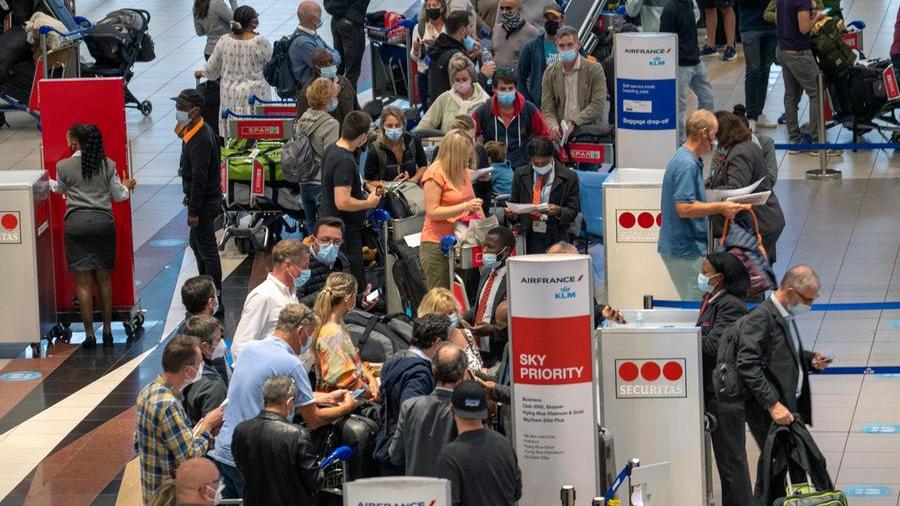
Omicron variant, here are the new restrictions in Europe
As cases of the new variant multiply, many countries decide on other restrictions: Poland and Norway stop flights from African countries, in Englandrra the obligation to wear the mask back. In Friuli-Venezia Giulia, the green lane goes into effect from today
The whole world is afraid of the progress of the Omicron variant, which in a few days since its discovery in South Africa has already crossed the borders of several continents. As the new strain spreads and new cases are discovered in Europe and Australia, many countries are implementing new measures.
South Africa
According to estimates by epidemiologist Salem Abdel Karim, South Africa, where the Omicron variant was first detected, will exceed 10,000 daily infections by the end of this week. But the Minister of Health used reassuring tones: “Do not panic, in the next few days our scientists will have the answers.” According to Dr Angelique Coetzee, Head of the South African Medical System, the alarm about the Omicron variant is “excessive and the reaction is disproportionate”.
new restrictions
Since Sunday evening, Israel has completely closed its borders to prevent the arrival of those infected with the new strain. The country had already announced the suspension of flights from abroad.
In England from Tuesday, a return to the obligation to wear a mask in shops and on public transport will be in effect, along with a commitment to self-isolation for anyone arriving on the island. Health Minister Sajid Javid said he hoped the new pressure would be lifted within weeks.
Japan will close its borders to all foreign visitors. This was announced by the Japanese government on Monday to counter the risks of an increase in infections. Just three weeks ago, the country eased some restrictions to allow foreign visitors to enter for business or study reasons.
On Sunday night, New Zealand closed its borders to travelers from nine South African countries: New Zealand citizens will only be able to enter the country from South Africa, Namibia, Zimbabwe, Botswana, Lesotho, Eswatini, Seychelles, Malawi and Mozambique.
“A 14-day quarantine period is also expected for them,” said the minister responsible for managing Covid, Chris Hepkins. The closure imposed on the city of Auckland, which has lasted for more than a hundred days, will be lifted next Friday.
Due to concerns about the new strain, Australia has also decided not to reopen international borders for skilled workers and students. Prime Minister Scott Morrison declared this a “necessary and temporary decision”. The borders were supposed to reopen on December 1.
new cases
To date, 33 confirmed cases of the Omicron variant have been reported from eight countries in the European Union: Austria, Belgium, the Czech Republic, Denmark, Germany, Italy, the Netherlands and Portugal. “All those infected have a history of travel to African countries,” the European Center for Disease Control said. No serious cases or deaths have been reported so far.
The Scottish government has announced the discovery of six new cases of the Omicron variant, bringing the UK’s total to nine. The Scottish Executive has asked health authorities to improve contact tracing in all cases. Scottish Health Minister Hamza Yusuf said authorities “must be vigilant until more is known about the alternative”.
Instead, Portuguese authorities reported 13 cases of the new type discovered on a soccer team in the country. Only one player made a trip to South Africa recently. The Ricardo Jorge National Institute of Health announced that one of the positives is the player Belenenses.
German Chancellor Angela Merkel and her designated successor, Olaf Schulz, will reach out to the provincial heads at the state regional conference on Tuesday: On the agenda are new measures to tackle the peak of the wave in Germany, where the infection rate exceeded seven days, rising to 452 cases per 100,000 residents.
G7 summit
An emergency meeting of G7 health ministers was held on Monday, at the invitation of London, the group’s rotating chair. “We must act quickly to increase vaccination efforts,” said EU Health Commissioner Stella Kyriakides. In a statement, health ministers praised “the exemplary work of South Africa to detect the strain and urgently alert the international community.”
On Tuesday, the European Commission will present a new Covid package, consisting of contact and authorized action. The communication will depict the state of the pandemic, while the mandated law will relate to the validity of the Covid certificate, which must be confirmed nine months after the end of the first vaccination cycle. Meanwhile, the President of the European Council, Charles Michel, announced the convening of a summit of the leaders of the EU-27 “as soon as possible”.
WHO concerns
The World Health Organization has warned that the Omicron variant could have serious consequences: “The potential for further spread globally is high,” the WHO wrote in a technical paper on the new variant. To date, no deaths related to the South African variant have been reported.
Explaining the meaning of the statement, Sylvie Briand, director of the WHO’s Epidemiological Risk Management Division, said: “We have described this as worrisome because all the teams in the world are getting the most information about this variant.” “It is a race against time to understand more and adopt the right countermeasures,” said European Commission President Ursula von der Leyen.
© All Rights Reserved

“Organizer. Social media geek. General communicator. Bacon scholar. Proud pop culture trailblazer.”
